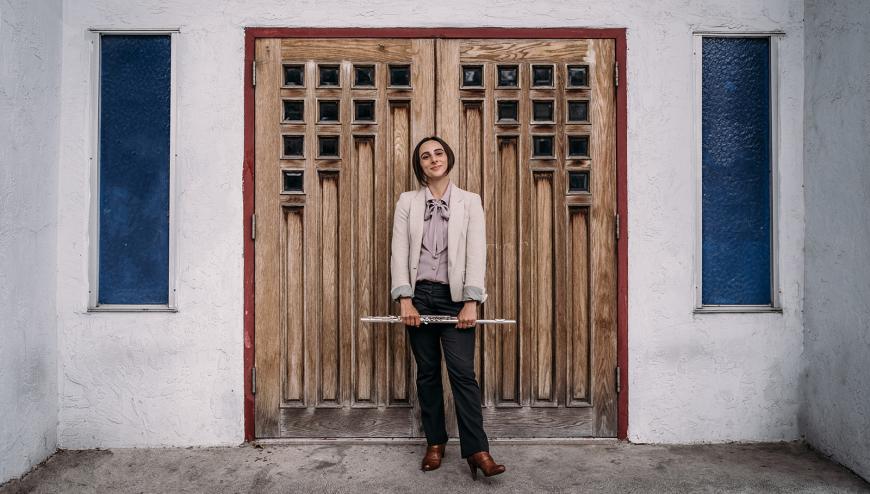
In a new year roiling with unrest both domestic and global, it seems timely to pay tribute to Greek composer Mikis Theodorakis, who died in 2021 at age 96.
From his enlistment in the communist Greek People’s Liberation Army in the early 1940s (while his country was under Nazi occupation), through his arrest and torture during the Greek Civil War, and on to his service in the Communist Party of Greece as a member of parliament and a minister in the 1980s and ’90s, Theodorakis was a paradigm of resistance and right action both in Greece and globally.
After gaining global recognition through the film score for Zorba the Greek, directed by Michael Cacoyannis and released in 1964, Theodorakis’s music was associated with such activist films as Costa-Gavras’s Z (1969) and State of Siege (1972) and Sidney Lumet’s Serpico (1973). Several of his scores are also credited with helping to awaken the world to the modes of Greek folk music, to which the composer returned after classical studies at the Athens Conservatoire (during the civil war) and at the Paris Conservatory under Olivier Messiaen.

Greek American flutist Ellie Falaris Ganelin has dubbed her Theodorakis tribute concert at Saint Mary Magdalen Church in Berkeley on Jan. 28 “Music of Resistance,” and she’ll be showcasing music not from the film scores. In a phone interview from her Berkeley home, she points out that Theodorakis’s compositions also included hundreds of symphonic works, chamber music, cantatas, oratorios, hymns, ballets, operas, and music for the stage, much of which was sourced in Greek myth. He also wrote poetry and nonfiction.
The concert, says Ganelin, is “easily the biggest thing I’ve done” as the director of the Greek Chamber Music Project (GCMP). The performance will feature five instrumentalists and mezzo-soprano Melinda Martinez Becker, along with the 25-voice Berkeley Community Chamber Singers (BCCS). The chorus’s director, Costas Dafnis, who is also Greek American, serves as music director and arranger for this program.
The evening will open with Theodorakis’s The Ballad of Mauthausen, based on poetry by Iakovos Kambanellis. “The lyrics are in Greek,” says Ganelin, “and Kambanellis was a Holocaust survivor and a friend of Theodorakis who was imprisoned at the Mauthausen concentration camp. The main melody — with the lyric ‘Do you know where my love is?’ — cuts to the heart and is incredibly nostalgic in Greece because it reminds people both of the Nazi occupation and of Theodorakis’s heyday in the ’60s, when the Greeks were fighting for justice and independence from a repressive regime. There was fascism in both periods. And Theodorakis was writing for the Greek populace, not just for a sophisticated classical-consuming audience.”
In 1971, Theodorakis was invited to Chile by democratic socialist President Salvador Allende, and a year later, the composer befriended Pablo Neruda in Paris and committed to setting the Chilean poet’s epic Canto General to music. Sections of the composition became an unofficial anthem of resistance back in Chile. GCMP’s concert will showcase highlights from the oratorio, sung in Spanish. “We’re paring down the orchestration,” notes Ganelin. “These are melodies that get stuck in your ear. There’s a grandness about them, with beautiful, lush sections showcasing the choir. And there are other sections with driving rhythms and parts where every couple of bars the meter changes … which reminds me of zeibekiko, an odd-metered dance in the Greek tradition.”
The world premiere of Chariot of Dragons, an original work by Dafnis, will complete the concert. It’s set to an English libretto by Terry Taplin, a poet, activist, and Berkeley city councilmember who shares Theodrakis’s engagement with art and politics. With funding from the city of Berkeley, Ganelin was able to commission this piece. “I gave Terry the direction,” she says. “I told him, ‘Here’s Theodorakis’s music, here are the librettos from Mauthausen and Canto General as a starting point, now let’s talk about what other topics could be of interest.’

“Terry’s topics have to do with mental health, the surveillance society, and the harsh urban landscape,” she continues, “all of which he weaves together in a way that feels like epic poetry with ancient myth but also science-fiction imagery. A lot of Terry’s subject matter and references have come from ancient Greece. But it’s also very much set in the modern day of southwest Berkeley, a redlined neighborhood with Latino and Black residents. Costas got it right away; he finds Terry’s poetry very evocative. And Costas has a style that uses jazz influences, with syncopation and shifting rhythms and lush chords.”
With Ganelin on flute, the instrumental ensemble will also include Mike Smith on guitar, Byron Hogan on cello, Mary-Victoria Voutsas on piano, and Sage Baggott on percussion. Mezzo-soprano Becker, a San Francisco Conservatory of Music alumna, has recently recorded with the Friction Quartet and collaborated with the Musical Art Quintet on a project involving Ladino (Judeo-Spanish) music and history. BCCS, an ensemble of amateurs, has been exploring the repertoire of contemporary music. “They’re all incredibly excited to be working on this project,” says Ganelin, pointing out that the Catholic church venue is ideally suited to a choir.
In addition to this concert, Ganelin’s GCMP has recently recorded instrumental tracks for a self-produced album to be released in May. GCMP will perform that same month as part of the San Francisco International Arts Festival and at Santa Clara University. For tickets and more information, go to GCMP’s website.


